Choosing the right hotel management software for your property requires a thorough evaluation of your unique needs, essential features, and vendor support, alongside a structured decision-making process.
Understanding the specific requirements of your establishment is paramount. Assess functionalities such as:
These critical steps significantly enhance operational efficiency and boost guest satisfaction.
Choosing the right hotel management software presents a significant challenge, particularly in an industry where operational efficiency is directly linked to guest satisfaction. With a multitude of options at hand, grasping the essential components of hotel management systems is vital for making an informed choice.
As properties endeavor to enhance their services and streamline operations, the difficulty lies not only in selecting a solution that caters to unique requirements but also in ensuring seamless integration with existing systems.
How can hotel operators effectively navigate this intricate landscape to identify the optimal software that elevates their establishment's performance?
Choosing the appropriate management system begins with a comprehensive understanding of its components. Hotel management software encompasses various systems designed to streamline operations, including:
Understanding these program types is essential for identifying the specific elements that the will best address your property's needs. Additionally, considering cost implications is crucial, as PMS pricing can vary significantly, with more affordable options around $5 per room per month and more sophisticated systems costing between $10 and $15 per room per month. A compelling case of successful PMS implementation is Boulder Falls Inn, which increased event revenue by 43% after transitioning to iVvy. This example demonstrates how the right choice can transform operations and enhance visitor experiences.
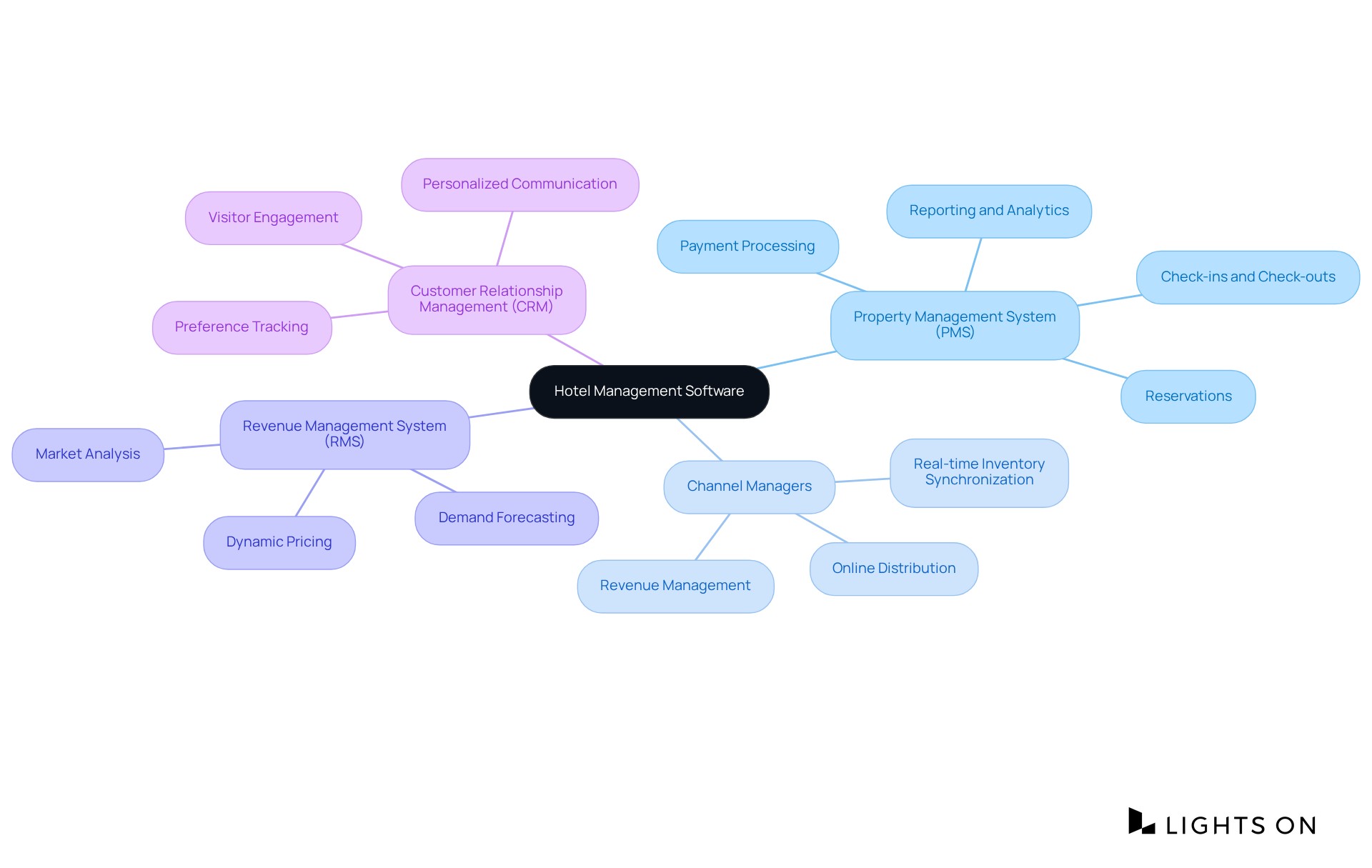
Each establishment or eatery has unique requirements that must be considered when selecting the software of hotel management. Begin by evaluating your property’s size, type, and target market. Consider the following factors:
Furthermore, in the event of a revenue manager transition, Lights On can seamlessly step in to perform the day-to-day duties of revenue management. This ensures that your hotel continues to optimize guest booking experiences and revenue strategies during staffing transitions. Conducting a thorough needs evaluation will enable you to effectively narrow down your options, ensuring that the selected solution aligns with your property's unique traits and objectives.
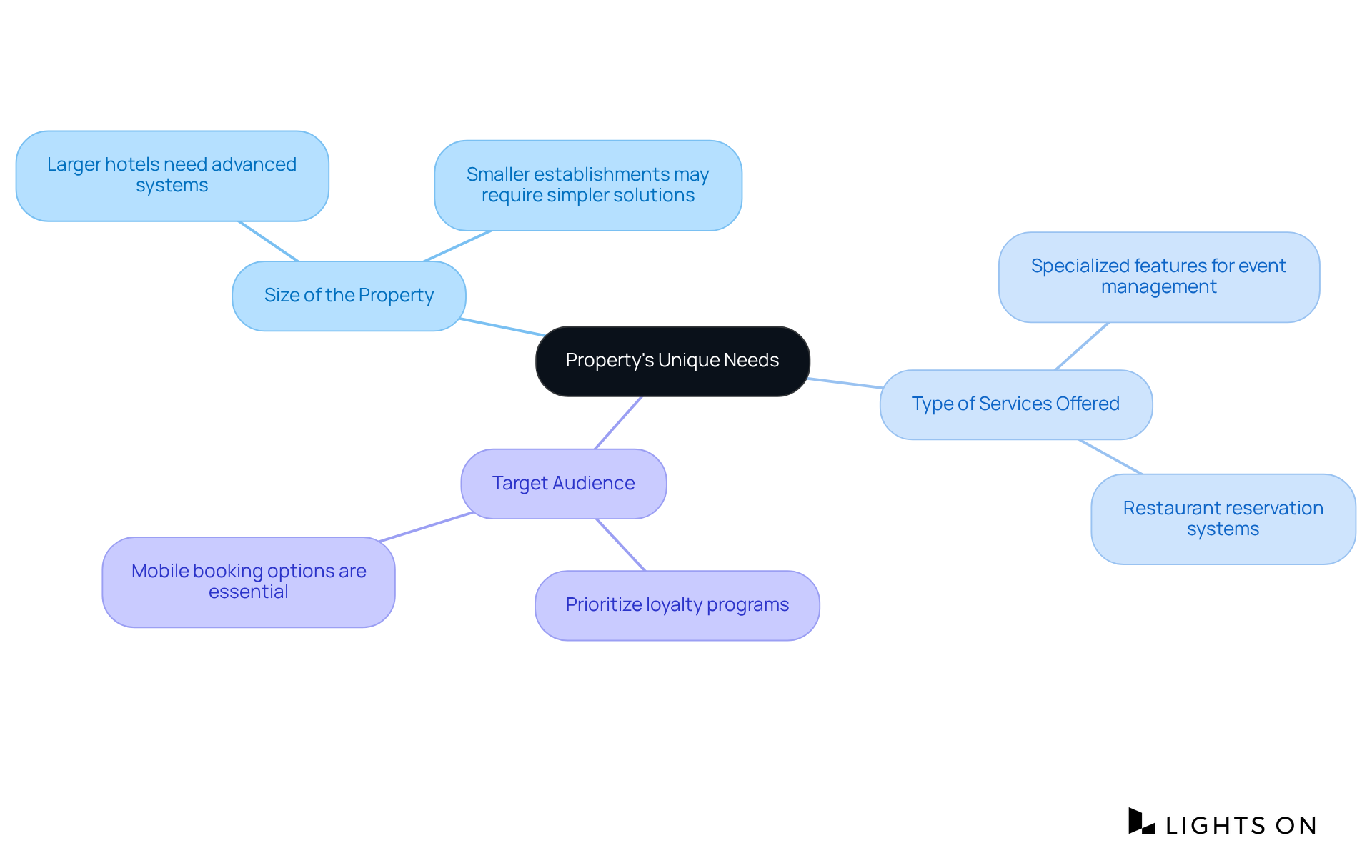
After determining your property's requirements, it is crucial to assess the key attributes of potential solution options. Consider the following essential functionalities:
Developing a checklist of these crucial features will enable you to evaluate various application options efficiently, ensuring you select the best match for your property. Furthermore, it is important to note that the implementation of a PMS typically takes 1 to 3 weeks, which should be a key consideration in your evaluation process.
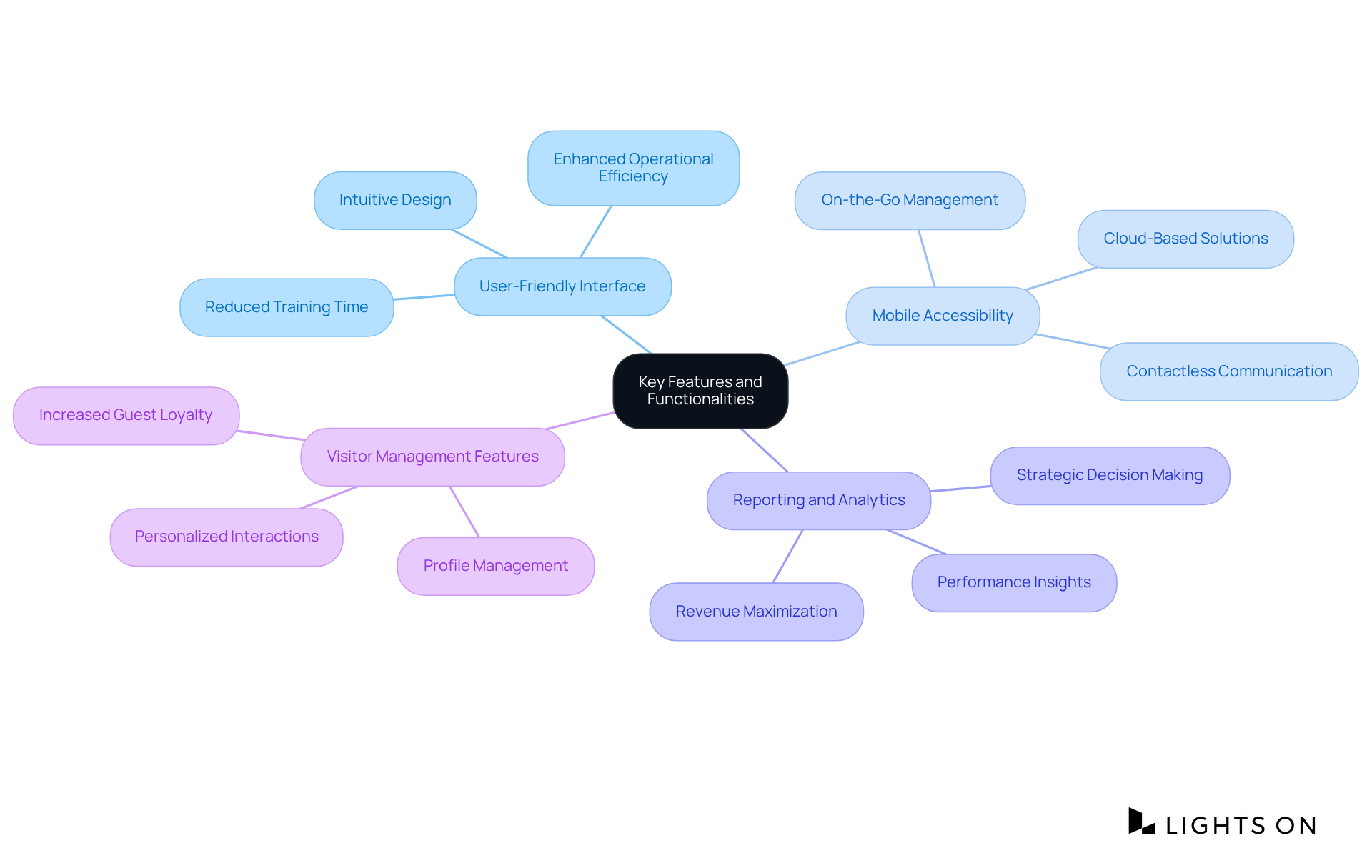
When selecting management applications, assessing their compatibility with your existing systems is essential. Key areas to consider include:
While a well-executed integration process , it is also important to acknowledge potential challenges. Resistance to change and integration issues may arise during implementation. Tracking performance metrics post-implementation is critical to assess the impact of technology on operations and revenue. As Steve Behrisch, President & CEO, underscores, 'The software of hotel enables integrated lodging technology that allows accommodations to provide personalized services to their guests,' emphasizing the transformative potential of seamless integration in enhancing guest experiences and overall performance.
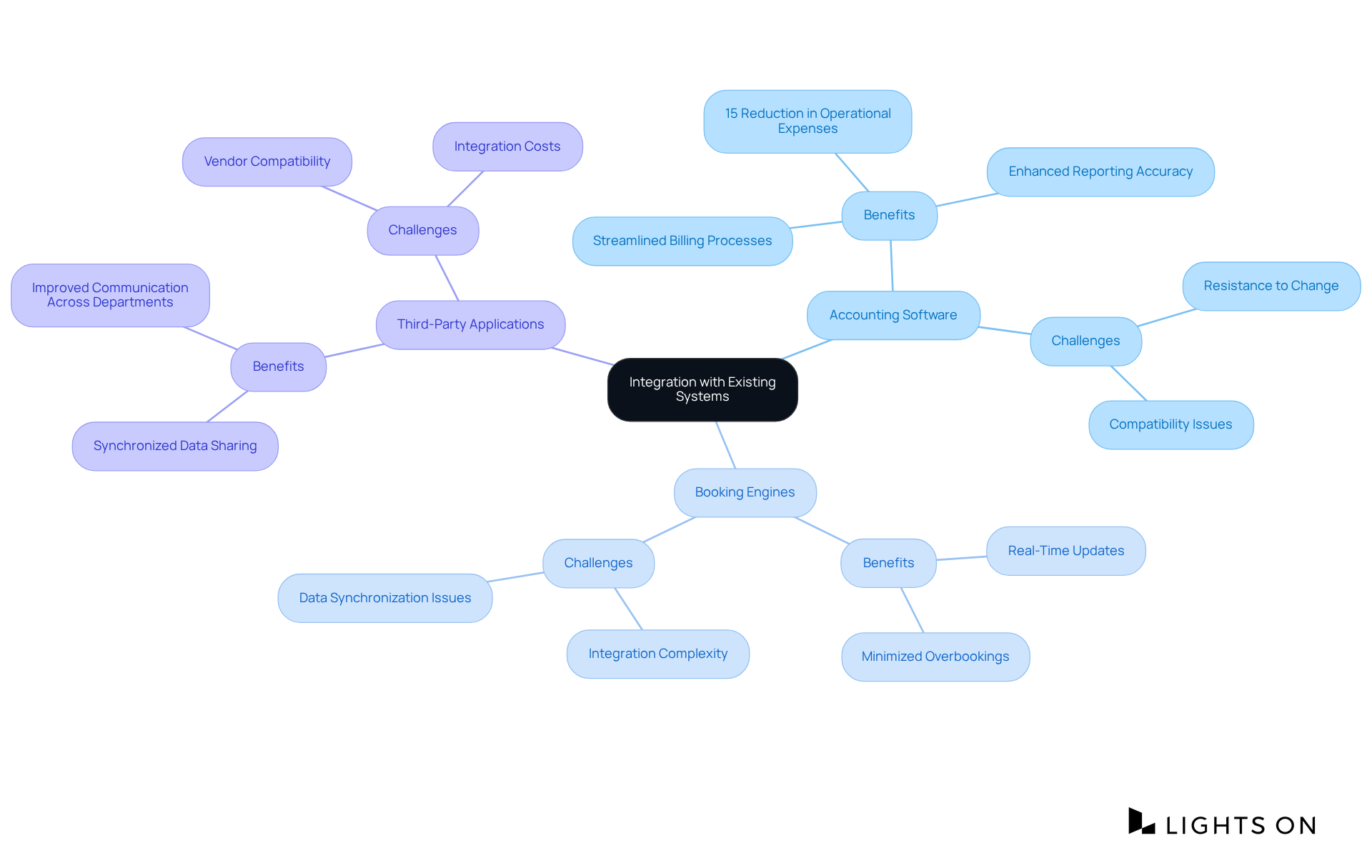
Evaluating the extent of assistance and education offered by your vendor is essential for enhancing the efficiency of the software of hotel management applications. Consider the following key aspects:
Choosing a supplier that emphasizes comprehensive assistance and training materials can greatly enable your team, ensuring they are well-prepared to utilize the software of hotel to its full capabilities. As industry leaders highlight, effective training is not merely an add-on; it is a fundamental element of successful application implementation that can result in enhanced guest experiences and operational excellence.
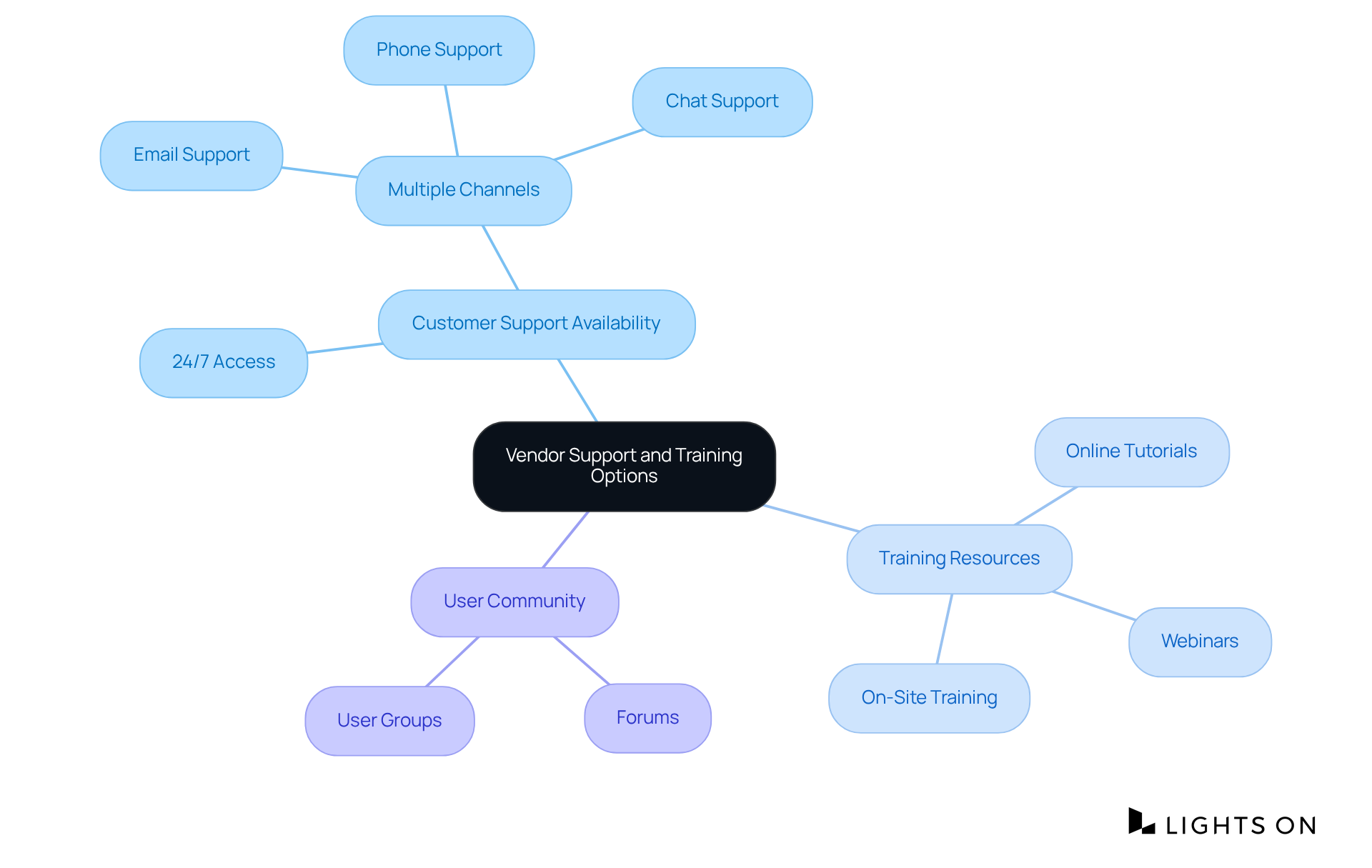
After evaluating all factors, making an informed decision is crucial. Follow these steps:
By following these steps, you can confidently choose the right software of hotel management for your property, ensuring a smoother transition and improved operational efficiency.
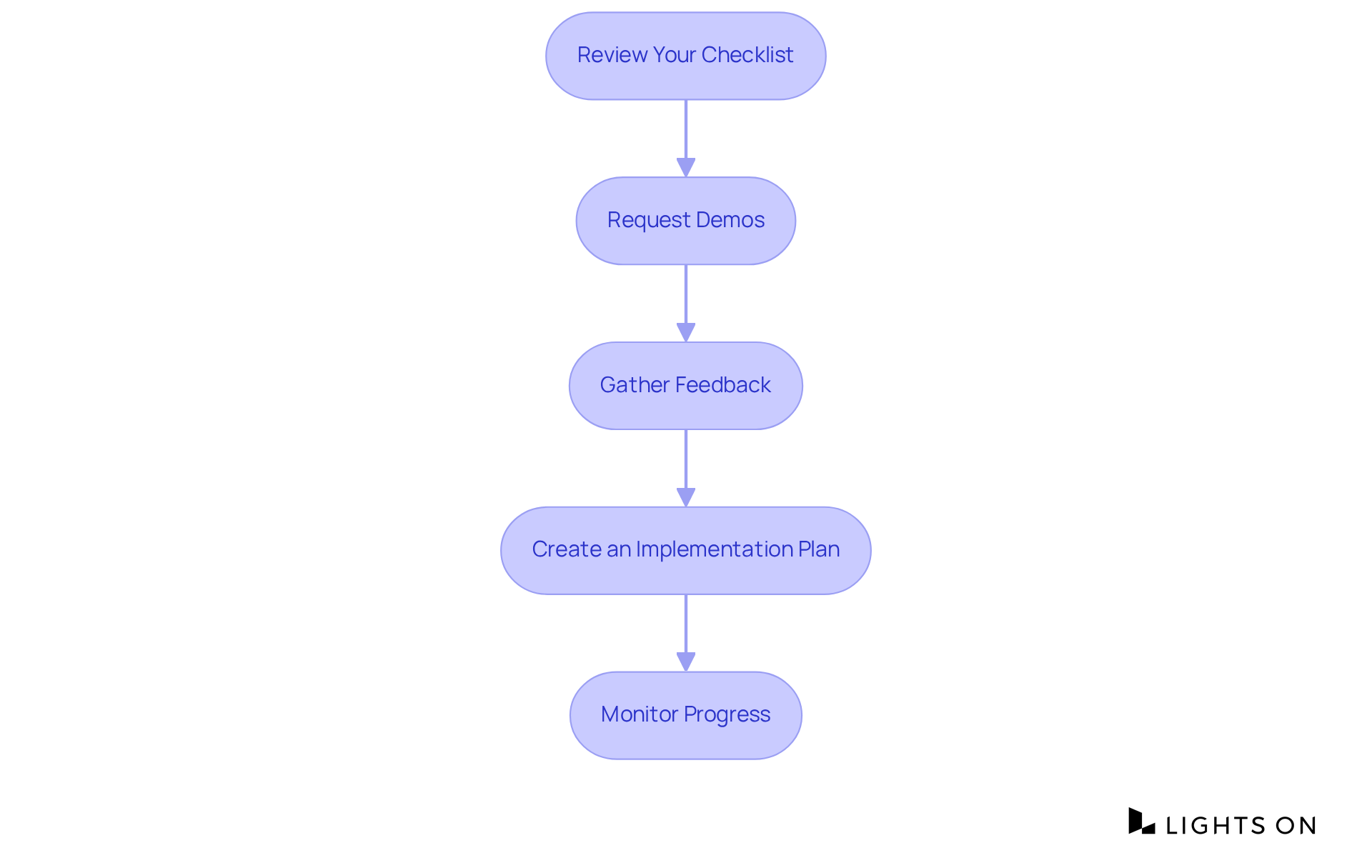
Selecting the right hotel management software is a pivotal decision that can significantly influence the operational efficiency and guest satisfaction of any property. By thoroughly understanding the various components of hotel management systems and assessing the unique needs of a property, hoteliers can make informed choices that align with their specific operational requirements.
This article outlines essential steps, starting from grasping the basics of hotel management software to evaluating key features and functionalities. It emphasizes the importance of considering integration with existing systems and vendor support options, ensuring that the chosen solution not only meets immediate needs but also supports future growth. Furthermore, engaging staff in the decision-making process and creating a comprehensive implementation plan further enhance the likelihood of a successful transition.
Ultimately, investing time and effort into selecting the right software can lead to improved operational processes, enhanced guest experiences, and increased revenue. As the hospitality landscape continues to evolve, leveraging technology effectively will be crucial for staying competitive. Therefore, it is essential to approach the selection process with diligence and foresight, ensuring that the chosen hotel management software truly meets the needs of both the property and its guests.
What is hotel management software and what are its main components?
Hotel management software includes various systems designed to streamline operations in hospitality. Its main components are Property Management Systems (PMS), Channel Managers, Revenue Management Systems (RMS), and Customer Relationship Management (CRM) systems.
What is the role of Property Management Systems (PMS) in hotel operations?
PMS serves as the backbone of hotel operations, managing reservations, check-ins, and check-outs. It has been a critical tool for lodging businesses for over 40 years, enhancing operational efficiency and guest satisfaction.
How do Channel Managers benefit hotels?
Channel Managers optimize online distribution across multiple platforms, ensuring maximum visibility and occupancy rates. They synchronize inventory in real-time to prevent overbookings and streamline revenue management.
What functions do Revenue Management Systems (RMS) provide?
RMS focuses on pricing strategies and demand forecasting, allowing hotels to dynamically adjust rates based on market conditions, ultimately maximizing revenue.
How does Customer Relationship Management (CRM) enhance visitor engagement?
CRM systems store visitor preferences and contact information, facilitating personalized communication that fosters customer loyalty.
What factors should be considered when selecting hotel management software?
When selecting hotel management software, consider the size of the property, the type of services offered, and the target audience's preferences.
How does the size of a property influence the choice of hotel management software?
Larger hotels typically require more sophisticated systems with advanced features to manage higher volumes of guests, while smaller establishments may need simpler, more streamlined solutions.
Why is it important to understand the target audience when selecting hotel management software?
Understanding the target audience's preferences, such as loyalty programs or mobile booking options, is crucial for prioritizing features that will enhance the guest experience.
What is the cost range for Property Management Systems (PMS)?
PMS pricing can vary significantly, with more affordable options around $5 per room per month and more sophisticated systems costing between $10 and $15 per room per month.
Can you provide an example of successful PMS implementation?
An example is Boulder Falls Inn, which increased event revenue by 43% after transitioning to iVvy, demonstrating how the right PMS choice can transform operations and enhance visitor experiences.
Transform your group booking strategies with Lights On and watch your occupancy soar.